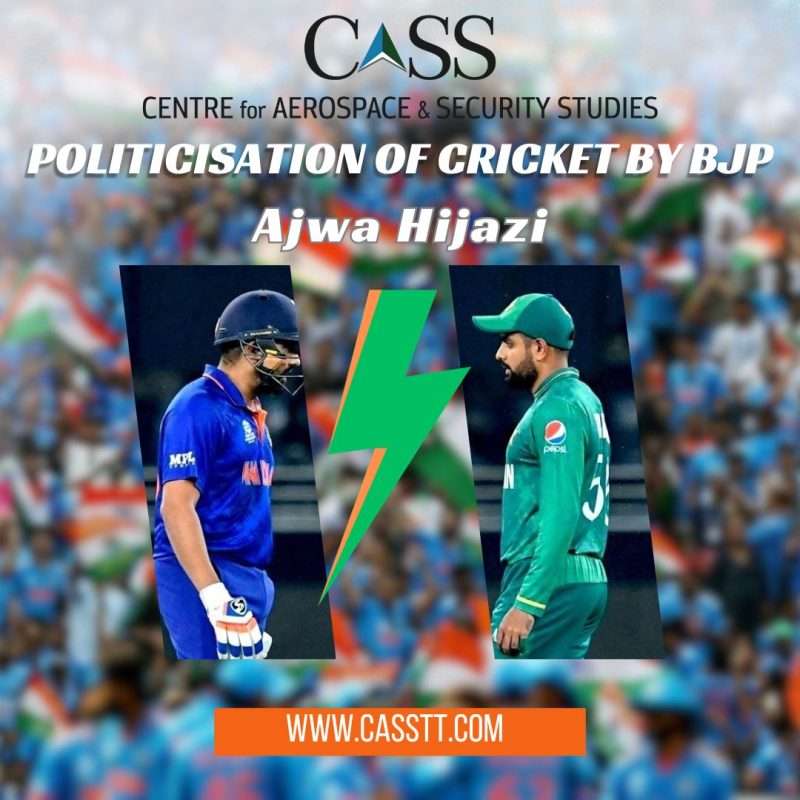Over 76 years, India and Pakistan have shared many things: three wars, restrictions on the exchange of goods, interconnected history, and their universal love for the game of cricket. However, the ever-contentious state of affairs between the two countries has gradually impacted cricket. There has been no bilateral series between the two countries for over a decade, and the only time the two teams face each other is in international tournaments, such as the World Cup, Asia Cup, and the Champions Trophy. The moment the schedule of the World Cup 2023, to be held in India from 5 October to 19 November, was announced, cricket fans around the globe, especially in the subcontinent, zeroed in on 14 October 2023.The date of not just any match – the colossus of contests, rivalling the excitement of five Super Bowls combined – the Pakistan vs India showdown.
Despite BCCI (Board of Control for Cricket in India) refusing to send its cricket team to Pakistan for the Asia Cup 2023 and playing its matches (scheduled in Pakistan) at a neutral venue, the Pakistan Cricket Board (PCB), conscious of its responsibility towards the spirit of the game, decided to go to India for the World Cup. The Pakistani team received its visas for India just two days before their departure. Upon its arrival in India, they were accorded a surprisingly warm welcome at the airport. It was the Pakistani cricket team’s first visit to India in around seven years. It stirred a hope that maybe the spirit of the game would somewhat diminish the impact of the animosities between the two states. Nevertheless, the events that transpired later during the India-Pakistan match proved that the raging polarisation and anti-Pakistani jingoistic mantra of Bharatiya Janata Party’s (BJP) majoritarian politics had spilled over to the game of cricket.
The India-Pakistan match was scheduled in the newly built ‘Narendra Modi’ cricket stadium in Ahmedabad – the largest city in the State of Gujarat. The venue’s name and location for this particular game looked less like a coincidence and more like deliberate political posturing. Moreover, in the stadium, with a capacity of over 130,000 people, there were only a handful of expatriate Pakistani supporters, because India did not issue visas to Pakistani spectators. Throughout the match, the general attitude of the audience in the stands starkly contrasted with notions of decorum and sportsmanship. They directed jeers and derogatory remarks at the Pakistani cricketers and responded with conspicuous silence whenever a Pakistani batsman hit a boundary.
Amidst such hostility, the Pakistani cricket team encountered blatant Islamophobia. As Muhammad Rizwan made his way back to the pavilion, he was greeted with mocking religious chants. It’s worth noting that these same chants have been weaponised by far-right Hindu factions to derogate the Muslim community in India.
While Pakistan may not have emerged victorious that day, what truly suffered a defeat was the essence of Indian sportsmanship.
Many renowned Indian journalists and sports writers noted the hostility on display coupled with Islamophobia by the crowd. According to the Senior Editor of ‘The Wire,’ Arfa Khanum Sherwani, the behaviour of many cricket fans was deplorable and reflective of ‘the majoritarian approach towards this sport, which is symbolic of India created by the Modi-RSS nexus in the past decade.’
There are historical instances where cricket was extensively employed as a means of diplomacy between India and Pakistan, especially from 2004 to 2008, when both teams played several bilateral series at each other’s home grounds. However, the prospect of bilateral cricket series between the two sides seems unlikely in the present scenario, where the BJP is bent on using cricket as a political tool to perpetuate anti-Pakistan narratives.
Furthermore, the ongoing World Cup is being treated as an extended election campaign by the BJP for the next Lok Sabha polls. It enjoys access and influence over BCCI, primarily, through Jay Shah, the son of Narendra Modi’s Home Minister, Amit Shah. Jay Shah is Secretary of BCCI and president of the Asian Cricket Council. He is directly involved in the World Cup’s logistics and arrangements. Some analysts have inferred that BCCI’s decision not to hold any World Cup match in Punjab was a political move to snub the state for voting in favour of the Aam Aadmi Party (BJP’s political rival) in the state elections last year.
The politicisation of the game, known for its spirit of sportsmanship and grace on the pitch, is another feather in the saffron-coloured cap of the BJP. In these circumstances, the buck stops at the International Cricket Council (ICC) to not let India use cricket to pursue its domestic politics. Moreover, ICC must follow through with Pakistan’s formal protest regarding the Indian visa policies in this World Cup, along with compelling New Delhi to ensure the Pakistan cricket team does not face any untoward and abusive behaviour from the crowd in its remaining matches. There is an immediate need for India to realise that the responsibility of hosting an international flagship sporting event necessitates letting go of its insecure, non-inclusive, and petty attitude reeking of Hindutva-ridden politics.
Ajwa Hijazi is a Research Assistant at the Centre for Aerospace & Security Studies (CASS), Islamabad, Pakistan. The article was first published in The News International. She can be reached at cass.thinkers@casstt.com.
Design Credit: Mysha Dua Salman




